“The Mad Man and Me at the Commercial School in Addis Ababa”
by John Coyne (Ethiopia 1962-64)
•
We 275 PCVs, the first to be assigned to Ethiopia, arrived in-country in early September of 1962. Addis Ababa, the capital, was at an altitude of 7,726 feet. It has one of the finest climates to be found in the world. It was once a ramshackle city, which years before the travel writer John Gunther described as looking as if someone had tossed scraps of metal onto the slopes of Entoto mountain.
I was assigned to live and teach in Addis, and lived my first year in a large stone house on Churchill Road, a main artery of the city that led uphill to the center of the city — the Piazza, with four other PCVs. That house, like most in Addis, had a tin roof and it was pleasant to wake early on school days during the rainy season and hear the heavy, amplified rain on the roof. At times during the rainy season, it was often so loud we were forced to shout at each other over the breakfast table just to be heard.
The rainy season brought cold weather to this mountain capital city and in the evenings, we would start a fire of eucalyptus kindling to warm the house. Also in the mornings, we needed to build a fire in the water heater for showers and to shave. Of all the memories I have, waking in the dark to hear rain on the tin roof of our home in Addis is a recollection I fondly remember, and one that reminds me the most of being a Peace Corps Volunteer in Ethiopia.
 There were four bedrooms in the house and my room, like the others, was big — twelve-by-twelve, with a high ceiling, walls made of chika (mud) and painted a pale blue. Two shuttered windows kept the room dark and cool in the mid-day heat. It had two doors — one that opened onto a narrow front porch and an enclosed garden with fruit trees and thick bougainvillea bushes, and where orchids grew wild, lush and abundant against the compound walls that encased the garden and our house.
There were four bedrooms in the house and my room, like the others, was big — twelve-by-twelve, with a high ceiling, walls made of chika (mud) and painted a pale blue. Two shuttered windows kept the room dark and cool in the mid-day heat. It had two doors — one that opened onto a narrow front porch and an enclosed garden with fruit trees and thick bougainvillea bushes, and where orchids grew wild, lush and abundant against the compound walls that encased the garden and our house.
Our house shared one of the walls of our compound with the private French elementary and secondary school, and behind the house was our backyard, where we stacked fire wood. There were also several small sheds and a space large enough to park a Land Rover. We didn’t have a Land Rover so the space was used by the houseboy to hang laundry out to dry, and where we parked our Peace Corps-issued bikes.
Stepping from my bedroom into the cold morning of Addis, I would always smell the strong antiseptic odors of thousands of burning eucalyptus fires as the city woke for coffee and breakfast.
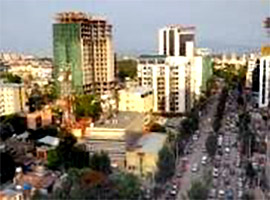 Since my years in Ethiopia those eucalyptus forests have been cut down for fuel and an expanding population. The capital has spread up the hillside of Entoto, and the city, thanks to Chinese aid, is filled with modern buildings, a street car system, and a new and overwhelming population.
Since my years in Ethiopia those eucalyptus forests have been cut down for fuel and an expanding population. The capital has spread up the hillside of Entoto, and the city, thanks to Chinese aid, is filled with modern buildings, a street car system, and a new and overwhelming population.
But this essay is not a travel article on what Africa was like nor, for that matter, is it about the wonders of our garden where we would sit in the late afternoon and correct students’ composition books while listening to the rush of traffic on the other side of the compound wall, the sounds of people passing by, and farmers herding goats and sheep up to the Mercato located beyond the Piazza.
No, this is a story of what happened to me shortly after I arrived in Ethiopia. One morning, just after seven o’clock, I was heading off to teach at the Commercial Secondary School. I opened the wooden front gate of our compound and stepped out onto Churchill Road.
The sidewalk in the early hours of the morning was crowded with kids in their uniforms headed for the French School. Luxury cars were also pulling up outside our compound to dispatch children. Parents of every nationality were speaking in Amharic and Italian, as well as, English, Spanish, German, and, of course, French.
At the corner was an intersection with a stop light that controlled the traffic, but this morning in the middle of the crossing, I spotted a man wearing a wild assortment of rags and animal skins and wielding a long wooden spear.
It took me a moment to realize that life was not “normal” on Churchill Road. Crowds of people were already massed together at this busy intersection staring at the strange man.
He had stopped all the traffic. Cars and trucks, pedestrians, as well as herds of animals headed for the market. They were held at bay by his handmade spear that he waved and violently lunged at any car or person who dared to venture into the intersection.
Before telling you what happens next, one more point worth mentioning. We had trained that summer of ’62 for two months at Georgetown University in Washington. A half dozen Ethiopian graduate students from across the States had been hired to teach us Amharic, and outside of class we would talk to them and try to learn about their Ethiopia, lessons we didn’t think we were getting from our area studies of the Empire.
These young students painted an idealistic paradise of their home, full of rural people living simple lives in tukul (hut) villages . . . small villages, and two modern cities; an African nation that did not need American know-how, or Western ways.
Several weeks into training a wave of doubt swept across the campus: Why were we going to Ethiopia to teach these happy people with their traditional values and way of life and destroy them and their “Brigadoon” world?
While these Ethiopian graduate students were nostalgic about their homeland, there was also our American image of what African was. Growing up having watched Johnny Weissmuller Tarzan movies, it took more than one session with medical doctors and State Department personnel to convince us that there was good work to be done in the Horn of Africa.
I mention this only to show that there in the middle of Churchill Road, on a beautiful early fall day in Africa, was a man blocking progress. A fierce looking Ethiopian straight out of a Tarzan movie.
Then the man’s attack on progress was shattered with the arrival of police cars with their sirens blazing. The Tarzan character ran for his life, raced down into the gully on the far side of the road, disappeared into urban bush and underdeveloped land beyond a festering sewer of a creek that ran through that section of Addis Ababa.
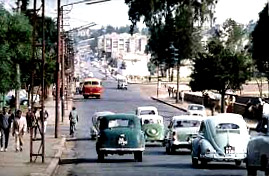
Churchill Road early 1960s
Rush hour traffic returned to Churchill Road. Children to the French School. Herds of livestock to the market. Luxury cars up the hill into the Piazza. The crowd dispersed. And I, with my new red Ethiopian Airlines flight bag full of students’ composition books, walked the mile downhill to the Commercial School just beyond Haile Selassie’s Square, and strolled through the gates into the school yard. The guard bowed respectively to
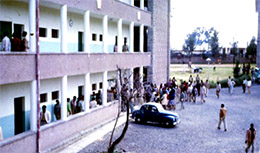
Students in 1962 waiting for class to begin
me, a ferenji (foreigner) teacher, and I nodded good morning as I crossed the compound where dozens of secondary school students waited patiently for the morning bell.
The Commercial School, when I was in Ethiopia, was one of the best secondary schools in the Empire. It had five grey stone three-story buildings, a large faculty, and over 450 students. The buildings were grouped around three sides of a quadrangle, with the fourth side opened onto Smuts Street. The quadrangle was paved with stone, with a small garden of flowers in the center, a flag pole, and a bust of the Emperor Haile Selassie.
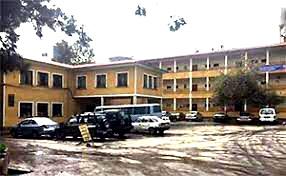
The Commercial School – 1962
The Commercial School — as were most of the secondary schools in Ethiopia until a few years before we arrived — had been a boarding school, and the dormitories had been converted into classrooms and a library, as well as a large faculty room. Our English faculty, the largest unit, was given a separate room. That day, after signing in, I went to my desk in the rear of the lounge to correct papers until second period. I forgot all about the raging Tarzan character.
When the 9:10 bell rang, I gathered up my books and papers and walked out of the lounge into the quadrangle. The guard was now standing by Haile Selassie’s bust in the center of the Quad and when he saw me, he stood again and bowed. Later I would, as all of us did, wonder where he had been when the trouble began and we needed him.
My morning class was an experimental one, a two-period class of second-year- students. If the experiment worked, education could be cut to eleven years, allowing the Empire to educate more students, quicker. There were twenty-two boys in the class and two girls. They were all bright students, ranging in age from 15 to 23.
Our classroom was on the ground floor. It faced the courtyard and when I sat at the teacher’s desk with the door open on warm days, I could see the Haile Selassie statue, the front gate, and the rush of traffic on Smuts Street.
And this is what happened that morning in early October of 1962.
The students as always stood when I walked in and said Tenyais tillin (How are you?).I answered the same; they replied Indeminadderu? (How did you spend the night?) to which I reply, Dehna. (Good!). The class monitor, Abebe Kebede Muleta, had placed the yellow attendance card on my desk. I counted heads and signed it.
The classroom was well equipped with desks and black boards and plenty of chalk. There were windows that looked out onto the back of the school and two modern tennis courts. Compared to other schools, the Commercial School was a gem. And I had a gem of an assignment as a PCV.
The school’s greatest asset was its Headmaster, Ato Seifu Felleke, who several years after I left the country would be honored by the Emperor as one of country’s outstanding leaders. Ato Seifu was so good that, even as young and inexperienced know-it-all PCVs, we realized quickly how able he was at managing students, managing the faculty, and managing the half dozen PCVs assigned to teach at his school.
He was slight, like most Ethiopians, and underweight, like most Ethiopians, and seemed to always be smoking two cigarettes at a time . . . like most Ethiopians. He was not handsome in the way many Ethiopian men are, but he had a presence and a command of situations that demanded our full attention.
Of course, I was new to Ethiopia, and all of this ‘wisdom’ about myself and Ethiopia would come years later, after I left the Empire, not on that warm morning in October.
First, I returned the students’ composition books, moving up and down the aisles, handing out the booklets to Ababayehu Asfaw, Konjit Wolde-Rufael, Asegedech Bzuneh, Emebet Awoke Gulech, and the rest of the class.
I was in the middle of the last row of the room, close to the windows, when we heard a ruckus in the compound courtyard. Shouts and yells, and screams from several girls. I glanced across the room and there in the middle of the doorway, filling the entrance with his size and wild garb was the mad man from Churchill Road.
He was still clutching his sword, and as I spotted him, he jumped into the room as if out of a tree, or from another century, and crouched down as I had seen him do earlier, battling the cars. Behind him was the school guard, a fragile, frightened man overwhelmed by what was happening. He was carrying a weapon, a short wooden club, a crude looking shillelagh.
I stepped a few feet up the aisle and closer to the front of the room, aware of the silence, of the students frozen in their seats as they saw the enormous size of this man who was standing beside my desk as if he was the teacher in charge. I realized then, that this situation was my responsibility. I had to deal with this mad man in my classroom. And I had no idea of what to do.
The Ethiopian in his leather skins and rags had fixed his eyes on me, froze me with his fierce look. Something told me that a friendly Amharic Tenyais tillin would not get me through this situation.
I took another step closer, still clutching a handful of composition books, as if they were my defense, and the man lunged forward, stopping me in my tracks. Two girls sitting in the front row seats screamed and knocked their books to the floor. In the doorway the guard took a tentative step into the classroom.
I kept thinking someone in the Headmaster’s office must have dialed Addis Ababa’s version of our 911, but there were no police sirens wailing into the school’s compound. Nor was their help arriving at my classroom door.
Then from the back of the room, Abebe stood, and spoke calmly to the man. All of us who taught in Ethiopia came to appreciate and respect the classroom monitor, a student selected by the others in the class to represent them, to dole out punishment, to negotiate with the headmaster. That day, this boy would save my life.
I didn’t know enough Amharic to realize Abebe Kebede wasn’t speaking in Amharic. I did not know he was an Oromo who were then called Gallas, which is now a pejorative term. The Oromo are the largest ethnic group in Ethiopia and have lived in the Horn of Africa as long as recorded history, but they were considered second-class citizens by the ruling Amhara’s. They were hardly that. The runner Abebe Bikila was an Oromo, and the first African and Ethiopian to receive a gold medal in the Olympics, running the marathon barefoot through the streets of Rome. He was the first of many Oromos who have won medals at the Games.
I learned later that Abebe did not know the man, but he knew he was an Oromo, and he knew how to take control of my classroom and this confrontation. The man was stunned, my guess, to hear his mother tongue and his eyes shifted from me to Abebe, then back to me. Abebe Kebede kept moving forward, still speaking softly. I didn’t move. Abebe was a row away as he stepped slowly towards the front of the room.
The class was silent. Out of the corner of my eye, I spotted several other boys stand up by their desks. Boys is the wrong term. These guys were in size and strength bigger than I, and also older, and they, too, were Oromos.
Abebe was my height, but twice my build. At the time, he was 18 or 19, but his friendly nature made him seemed younger. On this day, and at this moment, none of his innocence was evident. He approached the man with the calmness of a hostage negotiator. Later I would be reminded of the old western, Whispering Smith, starring Alan Ladd as a soft-spoken railroad detective who goes up against his best friend, played by Robert Preston.
Abebe moved to the front of the room, blocking the wild man’s view of me, protecting me, and the wild man backed off, and began banging into my desk. Several other students also moved up their aisle, as if they had all worked out a plan to corner the stranger at the head of the class. The wild man must have realized this as well as he swung his sword to keep the students back . . . and then thrust it in my direction.
Abebe raised his voice, said something urgently, gesturing towards me and waving his hand as if to dismiss whatever the man had said. He then gestured with his chin that the man should leave, motioning towards the open door. The school guard had disappeared.
Again, and unexpectedly, the wild man made another lunge at me, then halted, turned, and ran. He sprinted out the door and across the gravel compound, passed the bust of Haile Selassie and through the school gates. I reached the door to see him run into the traffic on Smuts Street and disappear on the other side.
Then I saw Ato Seifu running from his office and into the courtyard, followed by several other Ethiopian teachers. He was shouting at the school guard, and headed straight for my classroom.
Seifu had been schooled in India, not Europe or America, and had a wonderful “no bullshit” approach to any situation. He didn’t mess with our teaching, as he knew exactly how good we were in the classroom. Over the years the Peace Corps staff went to him for advice, to seek him out for his wise words, to ask for his help.
That morning in early September he was headed for my classroom. He was pissed and I was scared. Here I was, a new Peace Corps teacher, here — at least in my innocent eyes — to bring Ethiopian students into the modern age, and I couldn’t keep a mad man out of my classroom.
Arriving at the door, Seifu glanced around to see everything was in order and then addressed Abebe in Amharic. They spoke quickly to each other, then Seifu turned and spoke to the class, again in Amharic. His voice softened speaking to the students, and next he looked over at me.
I had come to the front of the classroom, still clutching my composition books. Seifu asked in perfect English if I was okay, and I nodded and said I was fine. He smiled, and said, “Welcome to Africa, Mr. John.”
Turning, he walked calmly out of the room, lit a cigarette as he crossed the compound, and returned to his office.
I was unable, however, to calm everyone down after this outbreak. Instead, I dismissed the class, and let them flee into the courtyard.
Stopping Abebe before he could leave, I thanked him and asked him how he had managed to get rid of the man.
“He is mad, sir.”
I agreed, and Abebe said the man thought I was the devil because of my white skin. I saw that Abebe Kebede was embarrassed telling me this and I asked him how he managed to get the man to leave. Again, his shy sweetness returned, and glancing away he said he told the “mad man” I was indeed the devil, and he should run away before I sent him to hell.
Well, it worked, I told Abebe, and thanked him for saving the day and saving me. He bowed in the polite way all Ethiopians have and followed the other students out into the courtyard of the school.
The next morning, and for several mornings after that, when I stepped through our compound gate out onto Churchill Road to head down the street to the Commercial School I would see the mad man in his leather skins and rags back in the intersection battling cars until the police arrived to chase him away. He did not, however, return to the Commercial School. Then just as suddenly as he arrived on Churchill Road he disappeared. I never saw him again.
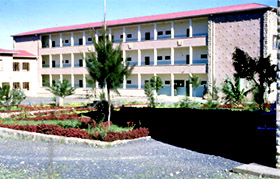 Several years later, I returned to Ethiopia, and I stopped by the Commercial School to say hello to Ato Seifu and we talked about the first Peace Corps teachers at his school and what had happened to them.
Several years later, I returned to Ethiopia, and I stopped by the Commercial School to say hello to Ato Seifu and we talked about the first Peace Corps teachers at his school and what had happened to them.
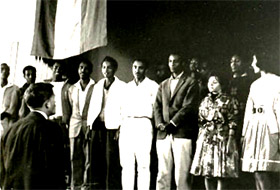
Sam Fisk teaching a choral group.
There were five of us assigned to the secondary school, Charlotte Crawford, Wanda Socha, Sam Fisk, Neil Boyer, and myself. I knew that Seifu had been involved with training of our group of 270 plus PCVs to Ethiopia, and I asked him if he had anything to do with our assignment to the Commercial School. He told me he did and picked us because of what he thought we could bring to his faculty.
Charlotte and Wanda were both older and had secretarial and business experience. The school focused on educating women and men to work in business and the government. Neil had a law degree and been an editor of several of his college journals. Sam had graduated from Brown and gone to graduate school at Columbia. He also had been an editor of his college paper. When he got to me, he paused and smiled.
“You were doing the Peace Corps a favor,” I offered.
“No,” he said, shaking his head. He had read my bio and saw I had taught secondary school while getting my masters in English, and knew I had some experience in a classroom that would be helpful teaching in Ethiopia.
“But not facing a mad man in my class,” I added.
We talked then about the “mad man” charging into my room, and Seifu, still smiling and remembering, shook his head and said nicely, “John, I thought I might lose you that day. You were very scared.”
I was, I told him, but I thought I was pretty cool, as I tried to put a positive spin on what had happened. Seifu kept smiling, and in the way he had of cutting through all our Peace Corps bullshit, added, “John, I never knew a white person could look so white.”
Thanks, John, for another bizarre but believable story.
Great story.
I’m headed back to Turkey next week for only the second time in over 50 years. Thinking a lot about language.
There is a saying in Turkish: “One language, one ‘adam,’ (man–human being) two languages, two adam.” The student who saved you and the class that day did so because he was already two adam–and learning to be a third.
hosca kalin! (stay well)
thanks Jhon for sharing your experience. It awakened me to compare the then US policy on Ethiopia with the present. I wonder if we were humane then than we are today. Or are we more blind about freedom?
John – Great story! and what a welcome to Ethiopia……After that, I’m sure you could deal with anything ……..:-)
One hell of a story, John. Hard to beat! Thanks for sharing.
Patricia Edmisten
This is a great read! And it does capture the kind of unforgettable (and hopefully unique) experience that will stick in your memory forever.
What a frightening experience, well told. I appreciated all the information about Ethiopia which gave a brilliant context. Thank you.
What a great story, John. Thanks for sharing it with us!
All the best,
Amanda Noble
Peace corps Philippines 77-78
Always a pleasure to read of John’s Peace Corps experiences in Ethiopia. In West Africa, mad people are not interfered with unless they represent a danger, then one their feet is tied to a log to slow them down. In general, people believe they are acting in the way they do because they are controlled by the spirit world, and nobody wants to mess with the spirits.
A wonderful remembrance! And beautifully told.
I love your writing. The details bring back many memories of truly exceptional students. What a wonderful story. Thank you.
Jeremiah Norris says:
John, Do I see a model here for something like “Tales of the South Pacific”. There must be a ton of similar great stories from so many other RPCVs–to be discovered.
Give it a thought!
I absolutely loved this story John.
 Patti
Patti
You brought the whole scene to life and I couldn’t put it down. I was transported to our other home and the Oromo people.
Thank you for a bright spot.
hi John —
Lest you berate me once again for “never reading my stuff” — a little game we’ve played for 25 years — let me rush to go on record to say I loved this gem of a story, love ALL your writing, and most of all, love you!
Another great read, John!!! Your writing humbles me. There’s no slack in it whatsoever. I’m still digging on memories of the head caddie and the suave … magician Harrison who takes over the novel “The Caddie Who Played with Hickory.” A shout out to John Coyne’s fans here to go there.
You constantly amaze me with your recall of the details of events going back sixty years, including the ever-present greeting, “Welcome to Africa, Mr. John.”
Enjoyed reading your article on your experience At the Commercial School. Very interested in connecting with PCVs like you, Neil Boyer and others who had taught there and /or met my dad.
I know ato Seifu’s son from his Canada days and he was a very strange, narcissist mad man who is so caught up in his father’s glory.